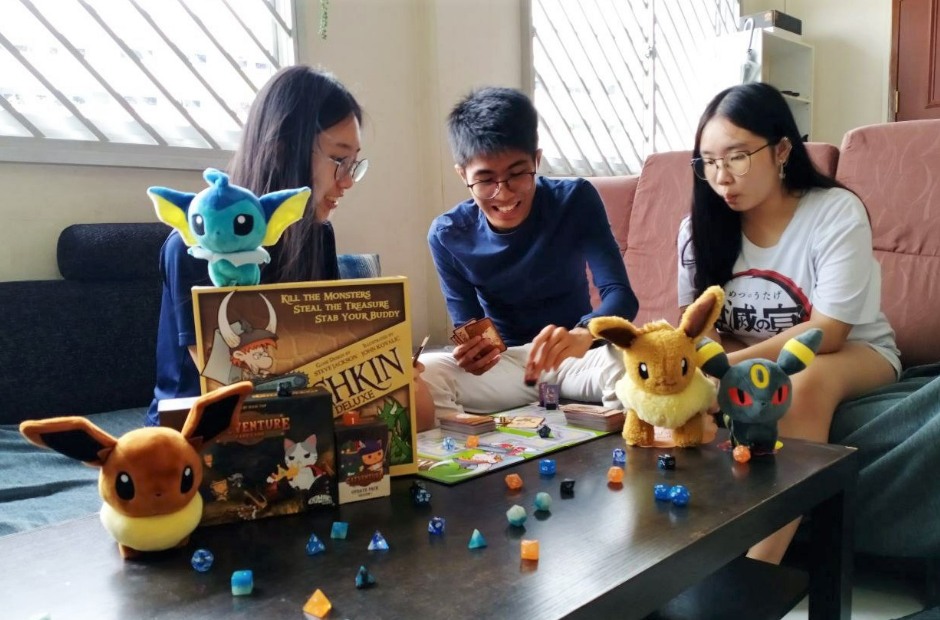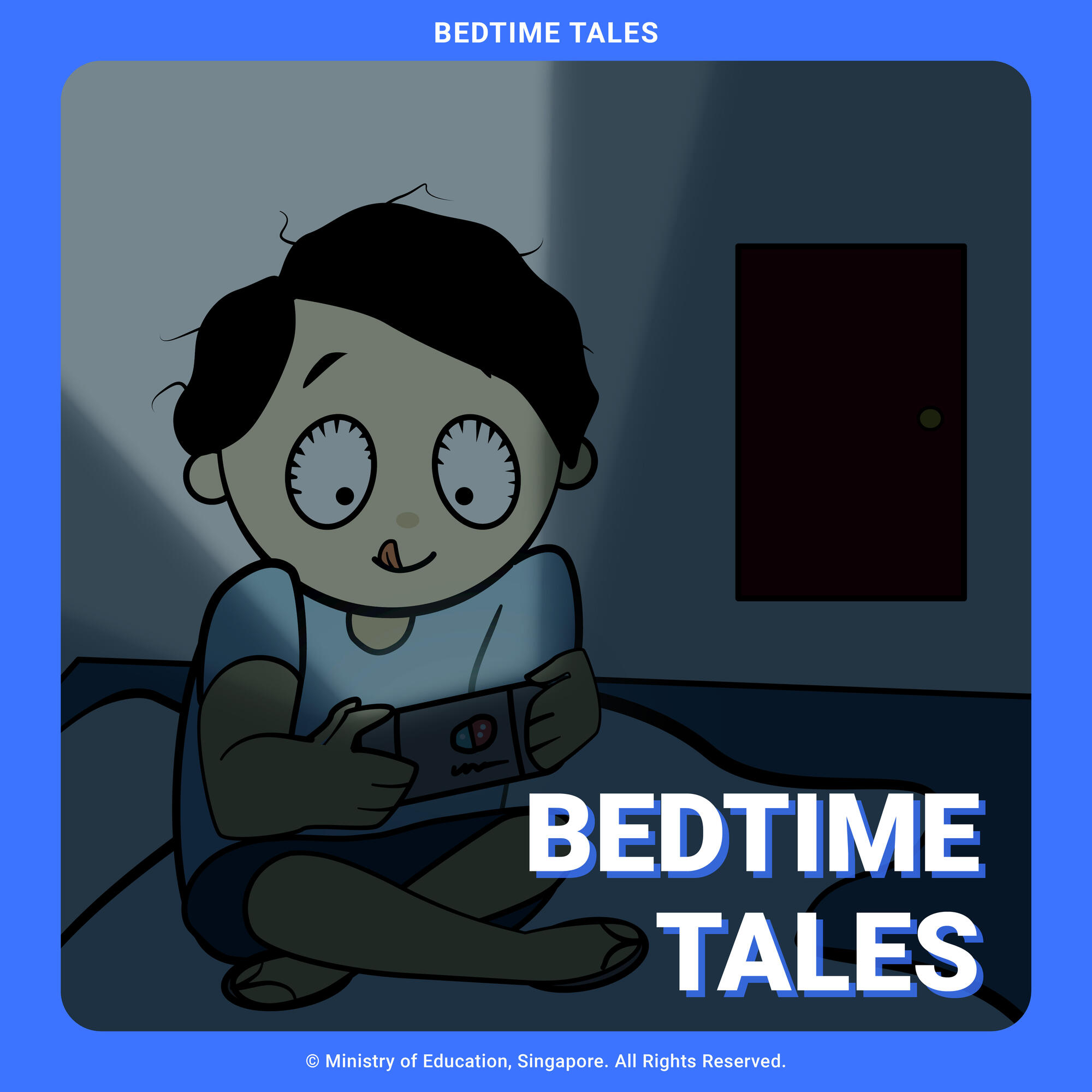How do you take care of your mental well-being?
Chong Han Lyn, 24, year 3 student at Yale-NUS College:
“I like to write down things that I did well in – positive things that make me happy – and paste them on my wall. Put up what you like about yourself on good days, so on bad days, you remember those things and the bad day doesn’t define you. I also see a counsellor from time to time. Professionals are able to give good tips on how to look at things in a different way. This helps me to navigate my issues the next time they come up. We should also normalise taking breaks; it’s okay to do nothing for a while.”

Ryan Ong (centre) with his friends during one of their regular board game sessions. (Photo taken before COVID-19.)
Ryan Ong, 22, former Computer Engineering student at Singapore Polytechnic, currently serving National Service:
“For me, it’s about taking breaks. I have to recharge to top up my ‘fuel’. If not, it’ll be like a machine running on very little fuel and things may break down. When I was in polytechnic, I was in school doing projects and studying till 9 or 10pm every day, but I spent 40 per cent of the time taking breaks, chatting with friends, playing board games. Friends are very important to me too. They’re my support pillars, who support and empower me, and bring down my stress levels.”

Hannah Batrisyia (left) with her family.
Hannah Batrisyia, 19, final-year Law and Management student at Temasek Polytechnic:
“It’s important for me to hang out with friends and family who are supportive of me. For emotional support, I simply tell people what I need, and I’ve realised that people are happy to help! It’s easier for them too, when they know exactly how to help. If everyone had a ‘needs list’ and shared it with people they love, the world would be so much better! A few years ago, I sat down with my mum and told her that as the eldest child in the family and the first to go through the O levels, I needed her support, rather than for her to compare what I’m going through with her own ‘back in the day’ experiences. She actually listened and became really supportive. When I need a listening ear now, she is one of the people I go to.”

Zhi Khong (left) and his friend participating in REACH’s Singapore Model Parliament in 2019.
Chong Zhi Khong, 25, year 3 Business Analytics student at Singapore University of Social Sciences:
“Having the right perspective helps. Maintaining a positive perspective in challenging situations helps me to manage stress. To gain these perspectives, I do volunteer work and engage with people of different ages. By listening to their stories and life lessons, I have learnt that there’re always positives and negatives to every situation. One perspective I’ve picked up is that stress is like friction – you need just the right amount to move forward. When I feel overwhelmed, it helps me to prioritise my to-do list. I try to finish things that involve and affect other people first, because those stress me out the most.”
How do you recognise that you, or someone you know, are feeling stressed or overwhelmed?
Han Lyn:
“I check in with myself daily – ask myself honestly how I’m feeling. Other than saying ‘I’m stressed, I’m not getting enough sleep’, I have to address it and not simply brush it off. Other signs could be chest tightness, or if I’m constantly thinking about things. Usually it happens when I have three or four submissions a week, or when deadlines start to pour in.”
Ryan:
“I recently met a friend. He is usually the calm one; the one advising me on issues. But when I saw him, he was very panicky. I could tell that he was under a lot of stress due to deadlines and job hunting. The difference from his usual behaviour was a clear sign.”
Hannah:
“I’ve observed that my younger siblings start to feel more sensitive to things. They cry more, snap at others, get more easily agitated, and I have to tiptoe around them. But it’s usually seasonal; when they have important deadlines or exams coming up. Afterwards, they go back to their normal selves. But if you notice someone’s mood remains low even after a stressful period, such ongoing symptoms may be a sign of an undiagnosed mental health issue like anxiety or depression.”
Zhi Khong:
“I realise that some tasks, even seemingly simple ones, can be draining for me because it’s not something that’s in my nature, like giving a presentation in front of a large audience. Some tell-tale signs are headaches, fatigue, or even procrastination. When my mind and body keep putting something off, it could be that it’s out of my comfort zone and the source of some stress.”
If you have a friend who’s feeling stressed, what would you do or say?
Han Lyn:
“I would tell them ‘There are times when negative thoughts may spiral. For instance, it’s easy to think that if you failed your exam, you won’t do well for your degree, you can’t get a good job, the future is bleak. Recognise that if one bad thing happens, that is simply it and we do not need to catastrophise it. You’re not alone, and help is always available. Talk to someone about your worries and fears.’ I also don’t hide that I see a counsellor, and when my friends come to me to ask about my experience, I usually encourage them to go, too.”
Ryan:
“I always try to be available for friends who want to talk. If they’re overwhelmed, I ask them to pause, take a step back first and think about what their priorities are. I’ve told a friend, ‘All your worries are valid, but if you’re panicking, you’re not going to be able to make the right decisions, and it’s going to be a negative loop.’ Every individual manages stress differently; some of us find it a motivator, others find it a limitation. We have to recognise that we have our own limits.”
Hannah:
“My motherly instincts kick in – maybe because I’m the eldest child and have younger siblings. The first thing I do is to just be there, and sayang (soothe) them. I don’t ask what’s wrong. I reassure them that they’re still loved, and I’m there to help. I’ll ask, ‘Do you want to cry?’ and allow them to let their pent-up emotions out. Afterwards, they usually slowly open up and tell me their worries or fears, and I’ll encourage them the best I can. I try to keep things factual, such as, ‘Look at your strengths instead of your weaknesses. Even if you only did well in one subject, it shows that you can do well in your studies; you have potential. If someone tasked you with something challenging, it’s because they believe you can do it. You just need to believe in yourself too. Do things at your own pace, no need to compare yourself with others.’ I’ll make it about them and create a safe space for them to talk about themselves.”
Zhi Khong:
“I reach out. Lack of attention, loneliness and solitude can contribute to stress. By being there for others, they have the chance to open up and share their problems. If a friend isn’t forthcoming, I may talk about myself first. Sometimes, it helps to open up about yourself, before others are willing to do the same. If they’re feeling overwhelmed, I’ll tell them to put themselves on their to-do list. It’s important to give time to yourself and allocate some priority to things you enjoy doing.”






